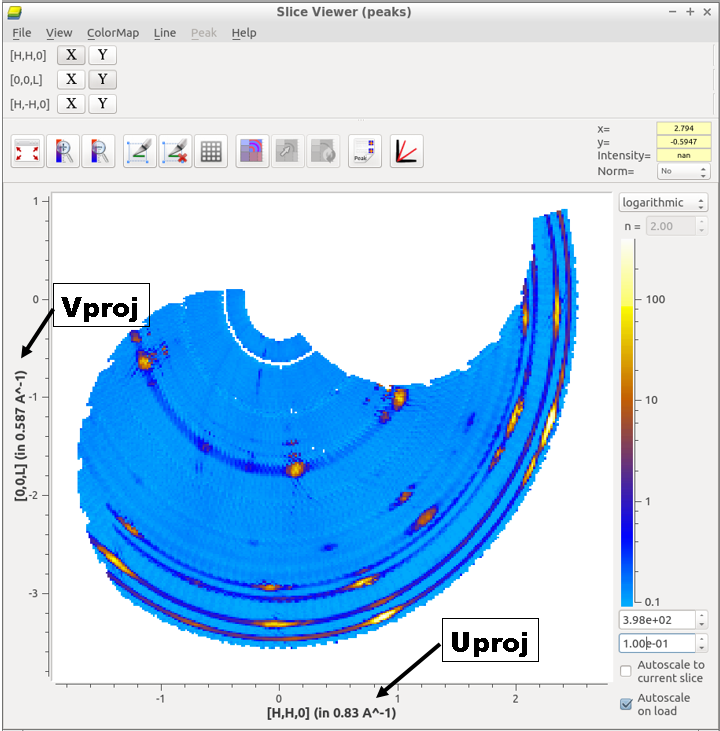\(\renewcommand\AA{\unicode{x212B}}\)
BASISDiffraction v1¶

Enable screenshots using DOCS_SCREENSHOTS in CMake¶
Summary¶
BASISDiffraction is deprecated (on 2018-08-27). Instead, use BASISCrystalDiffraction or BASISPowderReduction.
See Also¶
Properties¶
Name |
Direction |
Type |
Default |
Description |
|---|---|---|---|---|
RunNumbers |
Input |
string |
Sample run numbers |
|
MaskFile |
Input |
string |
/SNS/BSS/shared/autoreduce/new_masks_08_12_2015/BASIS_Mask_default_diff.xml |
See documentation for latest mask files. Allowed extensions: [‘.xml’] |
LambdaRange |
Input |
dbl list |
5.86,6.75 |
Incoming neutron wavelength range |
OutputWorkspace |
Output |
Mandatory |
Output Workspace. If background is subtracted, _data and _background workspaces will also be generated |
|
BackgroundRuns |
Input |
string |
Background run numbers |
|
BackgroundScale |
Input |
number |
1 |
The background will be scaled by this number before being subtracted. |
VanadiumRuns |
Input |
string |
Vanadium run numbers |
|
SingleCrystalDiffraction |
Input |
boolean |
False |
Calculate diffraction pattern? |
PsiAngleLog |
Input |
string |
SE50Rot |
log entry storing rotation of the samplearound the vertical axis |
PsiOffset |
Input |
number |
0 |
Add this quantity to PsiAngleLog |
LatticeSizes |
Input |
dbl list |
0,0,0 |
three item comma-separated list “a, b, c” |
LatticeAngles |
Input |
dbl list |
90,90,90 |
three item comma-separated list “alpha, beta, gamma” |
VectorU |
Input |
dbl list |
1,0,0 |
three item, comma-separated, HKL indexesof the diffracting plane |
VectorV |
Input |
dbl list |
0,1,0 |
three item, comma-separated, HKL indexesof the direction perpendicular to VectorVand the vertical axis |
Uproj |
Input |
dbl list |
1,0,0 |
three item comma-separated Abscissa viewof the diffraction pattern |
Vproj |
Input |
dbl list |
0,1,0 |
three item comma-separated Ordinate viewof the diffraction pattern |
Wproj |
Input |
dbl list |
0,0,1 |
Hidden axis view |
NBins |
Input |
long |
400 |
number of bins in the HKL slice |
Description¶
Run numbers: The syntax for the run numbers designation allows runs to be segregated into sets. The semicolon symbol “;” is used to separate the runs into sets. Runs within each set are jointly reduced. However, when Single Crystal Diffraction is selected, all run numbers provided will be reduced together.
Examples:
2144-2147,2149,2156 is a single set. All runs jointly reduced.
2144-2147,2149;2156 is set 2144-2147,2149 and set 2156. The sets are reduced separately from each other (except for Single Crystal Diffraction).
Mask file: The default mask (BASIS_Mask_default_diff.xml) covers all inelastic detectors as well as the tips of the diffraction tubes. The file is in directory /SNS/BSS/shared/autoreduce/new_masks_08_12_2015.
Lambda Range: a list containing a minimum and maximum values are required. Incoming neutrons with a wavelength outside this range will be filtered out. The default range is [5.86, 6.75].
OutputWorkspace: a two-dimensional MDHistoWorkspace containing the intensities projected onto the reciprocal slice, integrated over the independent axis Wproj. The diffraction pattern can be visualized with the Sliceviewer.
Background runs: one or more run numbers to describe the background, and a scaling factor between zero and one.
Vanadium runs: a set of runs to be reduced jointly provide an incoherent and isotropic scattering to determine instrument efficiency per detector. If no vanadium is provided, all detectors are assumed to have the same efficiency
Determine Single Crystal Diffraction¶
Creates a diffraction pattern from a set of runs implementing a rotational scan of the sample around the vertical axis. The corresponding goniometer’s rotation should be logged under log name PsiAngleLog. Option PsiOffset allows user to enter a shift for this angle.
Sample orientation¶
VectorU: Vector along k_i, when goniometer is at offset.
VectorV: In plane vector perpendicular to VectorU, when goniometer is at offset.
Diffraction preferences¶
Most of the scattering occurs in the plane defined by VectorU and VectorV. Please choose Uproj and Vproj defining a plane that is as close as possible to the scattering plane.
Uproj: Defines the first projection vector. Default (1,0,0).
Vproj: Defines the second projection vector. Default (0,1,0).
Wproj: Defines the third projection vector. Default (0,0,1).
Nbins: the diffraction pattern to be viewed is partitioned into an Nbins x Nbins grid, each grid rectangle assigned a particular scattered intensity.
If background is provided, two additional workspaces are generated. Workspace _bkg will contain the scattered intensity by the background, and workspace _dat will contain the scattered intensity by the sample with no background subtracted.
Timing: 10 to 15 seconds per sample run. A typical scan made up of 50 runs will take about 10 minutes to complete.
Usage¶
Determine single crystal diffraction pattern:
from mantid.simpleapi import BASISDiffraction
BASISDiffraction(SingleCrystalDiffraction=True,
RunNumbers='74799-74869',
VanadiumRuns='75524-75526',
BackgroundRuns='75527',
PsiAngleLog='SE50Rot',
PsiOffset=-27.0,
LatticeSizes=[10.71, 10.71, 10.71],
LatticeAngles=[90.0, 90.0, 90.0],
VectorU=[1, 1, 0],
VectorV=[0, 0, 1],
Uproj=[1, 1, 0],
Vproj=[0, 0, 1],
Wproj=[1, -1, 0],
Nbins=400,
OutputWorkspace='peaks')

Categories: AlgorithmIndex | Diffraction\Reduction
Source¶
Python: BASISDiffraction.py
